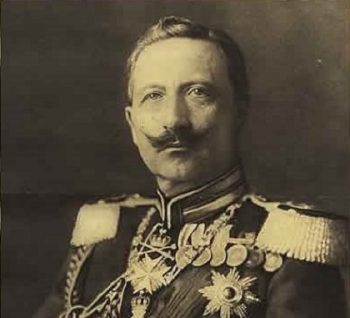
The first brick to fall out of Bismarck’s carefully crafted edifice was Germany’s Reinsurance Treaty with Russia. Harmed by Prussian trade policies, Russia did not renew the treaty and instead turned to France for economic assistance and military security. The two countries formally allied in early 1893. Britain joined them in 1907, even though France and Britain had nearly gone to war over a colonial dispute in 1898. Britain’s main reason for abandoning its usual posture as an aloof observer of developments on the continent was Germany’s plan to build a fleet of sixty battleships of the formidable Dreadnought class.
The chief figure in promoting the naval buildup was Admiral Alfred von Tirpitz, who is considered the founder of the modern German navy. Tirpitz was an effective spokesman for the program and had the ear of the Kaiser and his advisers. In 1898, after the Reichstag passed the first Naval Bill, Anglo-German relations deteriorated.
The assassination of Archduke Franz Ferdinand in Sarajevo on June 28, 1914, set off a series of diplomatic and military decisions that would end peace in Europe. The Kaiser gave a so-called blank check to his ally, Austria-Hungary, saying that Germany would support any Habsburg measure taken against Serbia, which had backed the assassination. Austria-Hungary’s ultimatum to Serbia in late July was so harsh that war became inevitable. Within days, a set of interlocking alliances had Europe’s great powers embroiled in what would become World War I.
Related articles:
Imperial Germany – the Second Reich
Political Parties in Imperial Germany
The Economy and Population Growth in Germany
The Tariff Agreement of 1879 in Germany and Its Social Consequences
Bismarck’s Foreign Policy
Germany in World War I
